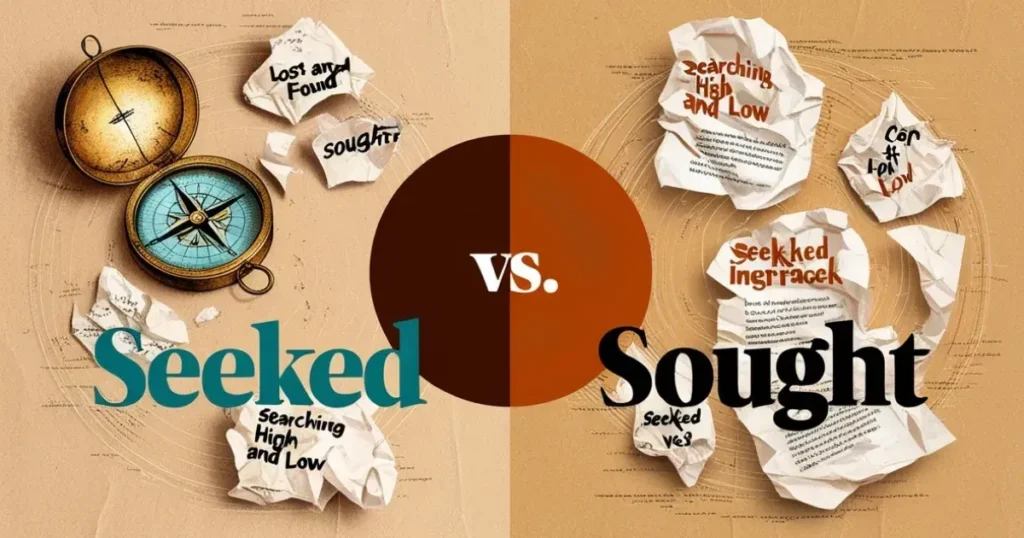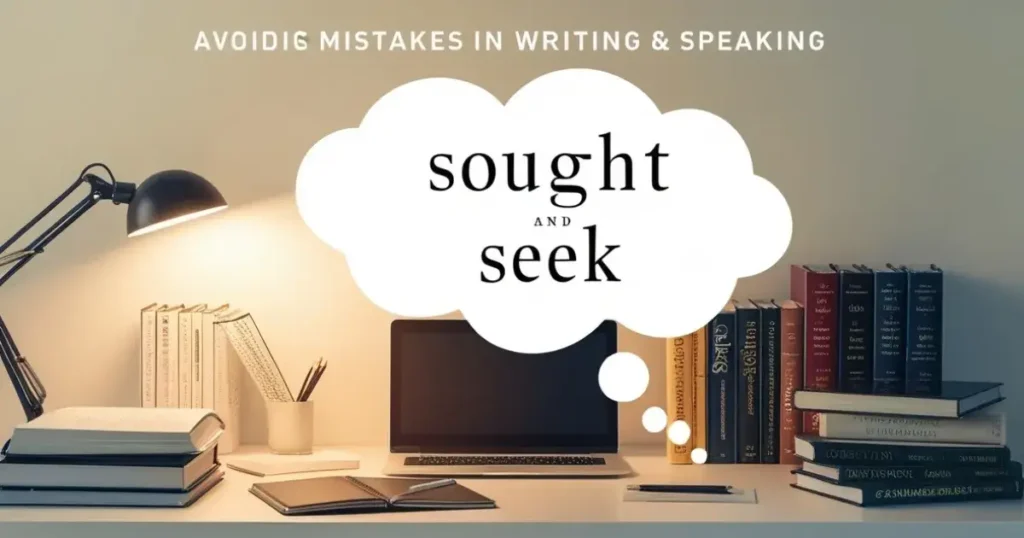In the English language, confusion often arises between similar-sounding words that may look identical at first glance but have different meanings or uses. One common case is the confusion between seeked and sought. Whether you’re a native speaker or learning English, understanding the differences between these terms is crucial for effective communication. This article will guide you through the distinctions, explain the proper usage, and provide clear examples to ensure that you don’t fall into the trap of using seeked or sought incorrectly.
Why “Seeked” vs. “Sought” is Important
Both seeked and sought stem from the verb seek, which means “to look for” or “to try to obtain.” While it may be tempting to assume that seeked is the past tense of seek, this assumption is incorrect. The proper past tense form is sought. Misusing these words, especially in formal or professional writing, can impact your credibility and clarity in communication. Imagine you’re writing a formal email or an academic paper, and you accidentally use seeked instead of sought. Not only does it sound odd, but it can also confuse your audience.
In this article, we’ll explore the grammatical nuances of seeked vs. sought, examine their usage, and highlight some key points about when and how to use each term correctly.
Definitions and Usage: The Core of the Debate
What is the Past Tense of Seek?

The verb seek means to search for something or to desire something. Seek is an irregular verb, meaning it doesn’t follow the typical rule for forming past tense verbs by adding “-ed.” Instead, the correct past tense of seek is sought.
- Seek (present tense): “I seek knowledge.”
- Sought (past tense): “I sought knowledge.”
The Past Tense of “Seek”: “Seeked” vs. “Sought”
When it comes to the past tense of the verb seek, a common point of confusion arises between seeked and sought. Let’s dive into the key differences and clarify why seeked is incorrect while sought is the proper form.
Clear Distinction Between “Seeked” and “Sought”
- Sought is the correct past tense and past participle form of seek. It is the word you should use when referring to actions that have already occurred. Example: “She sought help from a friend.”
- Seeked is not a valid word in standard English. Despite how it may sound or look, seeked is not recognized by grammar rules, and it should be avoided in both writing and speech. Example: “He seeked answers” is incorrect. The correct form is: “He sought answers.”
Common Misconception About “Seeked”
Many people mistakenly use seeked because they are following a familiar pattern seen with regular verbs in English. For example, with regular verbs like walk (walked), talk (talked), or play (played), the past tense is formed by adding “-ed” to the base form. However, seek is an irregular verb, and irregular verbs do not follow this pattern.
This is why seeked is incorrect—it does not follow the rules of irregular verbs in English. Instead of seeked, you should always use sought.
Why “Sought” Is the Correct Form

Explanation of How “Sought” Is the Proper Past Tense and Past Participle Form
Sought is the grammatically correct past tense and past participle of the verb seek. Irregular verbs, such as seek, do not follow the standard rule of simply adding “ed” to form the past tense. Instead, their forms change in unpredictable ways. Sought is a result of this irregular pattern.
- Seek (present) → Sought (past) → Sought (past participle)
For example:
- Present Tense: “I seek guidance from my mentors.”
- Past Tense: “Yesterday, I sought guidance from my mentors.”
- Past Participle: “I have sought guidance from my mentors over the years.”
The verb seek is used to indicate an attempt to obtain or search for something, and when you refer to a past attempt, you should use sought to indicate that the action is already completed.
Historical and Grammatical Reasons Why “Seeked” Doesn’t Work
The issue with seeked stems from the way English grammar evolved. Like many irregular verbs, seek follows a pattern that has been shaped by centuries of linguistic changes. Historically, English took words from different languages—like Old English, French, and Latin—and adapted them, often creating forms that don’t follow simple rules.
- For example, the verb go changes to went, know changes to knew, and seek changes to sought.
In these cases, the past tense form sought was developed in accordance with these ancient linguistic rules. Adding -ed to form seeked would create a regular verb where none existed, and this simply doesn’t conform to the grammar system of English.
Using seeked instead of sought would thus be a language error, and it reflects a misunderstanding of how irregular verbs function in English.
Comparison with Other Irregular Verbs
The confusion surrounding seeked or sought is part of a broader pattern seen with many irregular verbs in English. Other common irregular verbs change forms in unexpected ways, which is why it’s important to understand and memorize these exceptions.
Here’s how seek compares to some other well-known irregular verbs:
| Verb (Base Form) | Past Tense | Past Participle |
|---|---|---|
| Go | Went | Gone |
| Know | Knew | Known |
| Catch | Caught | Caught |
| Seek | Sought | Sought |
As you can see, these verbs do not follow the regular pattern of adding -ed to form their past tense. Instead, they undergo changes that are unique to each verb. This irregularity is a key characteristic of sought, just as it is for verbs like went and knew.
Synonyms for “Seeked” and “Sought”
Sought Synonyms
- Pursued
- Looked for
- Hunted for
- Searched for
- Explored
- Inquired about
- Requested
- Desired
- Chased
- Yearned for
Synonyms for “Seeked” (Note: Not Standard Usage)
Since seeked is not a valid form, it doesn’t have common synonyms. However, you might encounter informal uses of the word in place of sought, such as “looked for” or “searched for.”
Comparison Table: Seeked or Sought
| Aspect | Seeked | Sought |
|---|---|---|
| Definition | Not a valid word in English | The correct past tense of “seek” |
| Usage | Incorrect form | Correct form, used for actions in the past |
| Examples | I seeked knowledge. | I sought knowledge. |
| Grammar Rule | Incorrect; not recognized in standard grammar | Correct; follows irregular verb rules |
| Context | Avoid in all contexts | Use in both formal and informal settings |
When to Use Each Term: Avoiding Confusion
Sought: The Correct Form
- Past tense of “seek”: Use sought when referring to actions that have already occurred. This is the grammatically correct form for both the past tense and past participle of seek. Example: “The researchers sought new evidence to support their theory.”
- Past participle in perfect tenses: In the present perfect or past perfect tense, use sought to indicate a completed action. Examples:
- “I have sought advice from several experts.”
- “He had sought the truth for years.”
Avoid Using Seeked
- Seeked is an incorrect form of the verb. It does not conform to standard English grammar rules, as seek is an irregular verb. Using seeked instead of sought would result in a grammar mistake.Incorrect: “They seeked shelter from the storm.”Correct: “They sought shelter from the storm.”
Everyday Usage Examples
To further clarify the difference, let’s look at some real-life examples where seeked or sought might appear.
Example 1: “Seeked or Sought in a Sentence”
- Correct Usage: “They sought the truth after years of investigation.”
- Incorrect Usage: “They seeked the truth after years of investigation.” (This would be a grammar mistake.)
Example 2: Figurative Usage
Both seek and sought can also be used in a figurative sense, indicating the pursuit of abstract goals or ideals, such as happiness, knowledge, or wisdom.
- Correct Usage: “She sought peace in the midst of chaos.”
- Incorrect Usage: “She seeked peace in the midst of chaos.” (This would confuse your audience.)
“Seeked” vs. “Sought” in Different Contexts

Understanding when and where to use seeked or sought can make a significant difference in your writing. While seeked is incorrect in formal and most casual settings, sought is widely accepted in both spoken and written English.
Different Contexts Where “Sought” Is Used Correctly
- Formal Writing
- In professional and academic contexts, always use sought instead of seeked.
- Example: “The researchers sought new data to support their hypothesis.”
- Literature
- Authors and poets use sought to maintain a formal, timeless feel.
- Example: “He sought wisdom through years of hardship.”
- Everyday Speech
- Even in casual conversation, sought is more natural and grammatically correct.
- Example: “I sought advice from my friend before making the decision.”
Why “Seeked” Sounds Awkward or Ungrammatical in Formal Writing
Using seeked in formal writing sounds awkward because it’s not a recognized word in standard English. It breaks the rules of grammar, making your writing appear unpolished. Seeked or sought creates confusion, and sticking with sought ensures clarity and professionalism. Seeked is considered a grammar mistake and should be avoided, especially in professional settings.
Example of mistake: “I seeked legal advice.”
Corrected: “I sought legal advice.”
How to Avoid Mistakes in Writing and Speaking

Quick Tips for Avoiding “Seeked” in Both Casual and Professional Writing
- Focus on the past tense: Remember, seeked is never the correct past tense form. Always use sought.
- Practice with examples: Write or say sentences like “I sought shelter,” and “They sought help.”
- Read aloud: If you’re unsure whether you’ve used the correct form, reading your sentences out loud can help. If it sounds wrong, it probably is!
Quick Tricks for Remembering the Correct Form (“Sought”)
- Think of irregular verbs: Like go becomes went, seek becomes sought. This is a common pattern for irregular verbs.
- Use mnemonic devices: Remember “sought has an ‘o’ in it, just like the word ‘found’,” to help recall that sought refers to something already searched for or achieved.
Resources to Improve Grammar and Usage
- Grammar Checkers: Tools like Grammarly or Hemingway can catch errors like seeked and recommend sought instead.
- Online Dictionaries: Websites like Merriam-Webster or Oxford English Dictionary offer clear explanations of verb forms, including sought and its proper usage.
- English Grammar Books: Refer to books such as The Elements of Style by Strunk and White for a deeper understanding of verb tense and irregular forms.
Seeked or Sought: Common Misconceptions
Misconception 1: “Seeked” as the Past Tense of Seek
Many people wrongly assume that seeked is the past tense of seek, much like regular verbs like walk (walked) or talk (talked). However, seek is an irregular verb, which means its past form doesn’t follow this rule. Always use sought instead of seeked.
Misconception 2: Using “Seeked” in Professional Writing
In formal writing, using seeked can make your work appear unpolished and grammatically incorrect. If you want to maintain clarity in communication, it’s best to use sought in all instances of the past tense.
FAQs
Is it sought or seeked?
The correct form is “sought,” not “seeked.” “Sought” is the proper past tense and past participle of “seek.”
Is seeked the past tense of seek?
No, “seeked” is incorrect. The past tense of “seek” is “sought.”
When can I use sought?
“Sought” is used to describe actions of searching or attempting to obtain something in the past, such as in formal, casual, or literary contexts.
What is meant by “sought”?
“Sought” refers to something that was searched for or desired, indicating an attempt to find or achieve something in the past.
How do you use sought?
“Sought” is used to express actions of searching or trying to obtain something in past contexts, like “She sought advice from her mentor.”
What does got sought mean?
“Got sought” implies that something or someone was searched for or pursued, often used in a context where the action of being sought is emphasized.
Conclusion: Mastering the Difference Between Seeked or Sought
In summary, the confusion between seeked or sought is quite common, but understanding the grammatical rules surrounding the verb seek can easily clear things up.
- The correct past tense and past participle of seek is sought.
- Avoid using seeked, as it is not grammatically correct.
- Always remember that sought can be used in both past tense and present perfect tense, while seeked is never acceptable.
By paying attention to these distinctions, you’ll not only improve your writing skills but also enhance your clarity when communicating. Whether you’re writing an email, a report, or an academic paper, using the correct form of seek—sought—will help you sound more professional and precise.
If you have any lingering doubts or examples you’d like to explore, feel free to leave them in the comments below!

This author is a passionate linguist and grammar enthusiast, dedicated to helping individuals master the art of language. With years of experience in teaching and editing, she brings clarity and precision to every sentence. Tina’s mission is to empower writers of all levels to express themselves with confidence and excellence.

